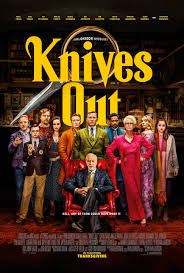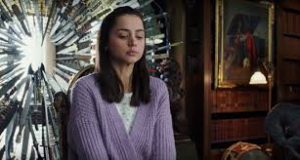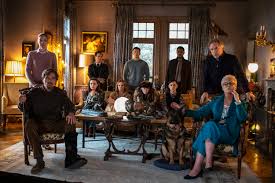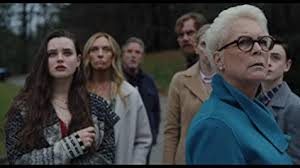
Knives Out was nominated for Best Original Screenplay at this year’s Oscars. It didn’t win. The Academy favored Parasite over Knives Out, and indeed, Parasite had a deservedly big night. A couple of weeks ago, I wrote here about its Best Picture win, and I broke down in detail the effectiveness of its screenplay and the complete Hero’s Journey contained therein. Parasite was a deserving winner, however the achievement of the screenplay for Knives Out should not be diminished or forgotten. Rian Johnson’s mystery movie harkens back to the great stories of Agatha Christie and pays homage to the great sleuths of cinema. Had I been an Oscar voter this year, I would have voted for Knives Out based on its mastery of, not only the Hero’s Journey and strong story structure, but also technical prowess. This is a technically savvy screenplay in which Johnson used all of the tools in the writer’s tool box to craft a story that was thoughtful, witty and entertaining.
Almost nothing in Knives Out happens in a vacuum. Nearly everything that happens has a direct or indirect effect on some other aspect of the story. Nothing is thrown away. There are no McGuffins, no non sequiturs.
Knives Out is a meticulously crafted film on every level and it starts with the screenplay.
Act I of the film opens with a prologue of sorts. Fran, the housekeeper, pours coffee into a cup that says, MY HOUSE, MY RULES, MY COFFEE. She carries a breakfast tray upstairs and we get the inciting incident of her discovering the body of Harlan Thrombey (Christopher Plummer), the wealthy author, who died by apparent suicide of cutting his own throat. That kicks off a story that has a dynamic Hero’s Journey and a tight cinematic structure.

The Ordinary World picks up a week after Harlan’s death and we see various family members giving back story to the police. We are also introduced to Benoit Blanc (Daniel Craig), a private investigator who has been hired by a client unbeknownst to anyone, including Blanc himself. The most important person, however, is Marta (Ana de Armas), who served as Thrombey’s private nurse, and has the unusual condition of vomiting whenever she tells a lie. Blanc, along with two police detectives interview the family members. None of them are particularly cooperative, and at least four of them had a reason to want to kill Thrombey. Thrombey had fired his son Walt (Michael Shannon) from his position running Thrombey’s publishing house. He caught his son-in-law Richard (Don Johnson) cheating on his wife and Thrombey’s daughter Linda (Jamie Lee Curtis). He threatened to cut off the allowance to his daughter-in-law Joni (Toni Colette) after discovering that she’d been double dipping the college tuition for her daughter Meg (Katherine Langford). Finally, we see that he was planning on cutting off is grandson and the son of Richard and Linda, Ransom (Chris Evans), by cutting him out of his will.

There is a ton of exposition in the first 15 or 20 minutes of the film, but you need to be paying attention because there is also a ton of foreshadowing. Johnson uses the technique of Planting and Payoff like crazy in this script, and several key elements are planted here that will payoff at stages throughout the film.
There are a couple of Calls to Adventure. The first one is revealed by Blanc telling the police he was hired by an anonymous person who sent him an envelope of cash, and a note asking to investigate Thrombey’s death. However, Thrombey himself gives Marta the true Call to Adventure when she thinks that she gave him a shot of a lethal dose of morphine rather than the less powerful pain killer she’s supposed to give him, and Thrombey presents her the plan of how to get away with accidentally killing him. She tries to Refuse the Call by begging him to let her call an ambulance, but he talks her out of it, knowing that there isn’t enough time. We get three examples of planting and payoff in this stage of the journey. The first is when part of the plan involves climbing the lattice outside the house to sneak into his room. As she’s climbing, part of it breaks. That’s the first plant. The second plant involves the part of the plan in which Marta needs to avoid being seen by the surveillance camera and she fails. The third plant is when she’s seen by Nana Thrombey’s elderly mother, who thinks she’s Ransom.

We Cross the First Threshold when Blanc asks Marta to be by his side when he searches the grounds the next day. That leads us into Act IIA and the Tests, Allies and Enemies portion of the story. It starts with a flashback. The first test Marta has to go through is following through on Thrombey’s plan after witnessing him kill himself. It looks like she might crack under the pressure, but a wonderful acting performance by de Armas shows a look of determination that can’t be broken. We also see the blood on her shoe from the splatter of Thrombey cutting his own throat (another plant). The next test we see is finding out about the video and knowing that she pulled off the road where the camera could still see her. We also hear that the tapes can be destroyed using a magnet, and we see Marta’s quick thinking when she sneaks a magnet near the tape, destroying its usefulness (Payoff). Then she sees the mud that she obviously put footprints in when walking back to the house. She then contaminates the mud by walking through it in front of Blanc and the police. Finally they walk up to the house and Marta finding the broken piece of the lattice (Payoff), and throwing it away for the dog to fetch.
All of these tests serve not only to propel the story, but they also build Marta’s character. We see that she thinks quickly, has ingenuity and the ability to get out of tight situations. All of these things endear her to the audience as a character and organically allow for us to root for her. We’re not rooting for her just because she’s the hero and we’re supposed to root for her. Johnson took the time in these two stages of the Hero’s Journey to proactively create in her a character that we want to root for. One of the ways he did that was by giving her a unique flaw. She physically cannot lie. Any time she even thinks about lying, she pukes. This is used to great advantage by other characters throughout the film, but she uses it to get ultimate revenge at the end. That type of flaw humanizes Marta in a way that allows the audience to relate to her and to root for her.
This type of character development can be instructive to any aspiring screenwriter.

The Approach shows Ransom arriving to the house for the reading of the Will. We also see the dogs barking at him, which is another Plant. The attorney (Frank Oz) arrives to read the Will and the family has some disagreements over it. Walt is particularly upset at seeing Ransom there when he wasn’t even at the funeral (another Plant). The disagreement turns into a lame fist fight before Walt’s son Jacob says what he heard in a fight the night of the party when Thrombey told Ransom he was out of the will. Then the dog drops the broken part of the lattice and Blanc discovers that the lattice leads to Thrombey’s room. Now he knows someone snuck into Thrombey’s room undetected (Payoff).
That, combined with the Supreme Ordeal changes the direction of the story when the Will is read stating that Marta is the sole beneficiary of Harlan’s entire estate, including the mansion, $60 million in cash and sole ownership in his publishing company. All hell breaks loose at that point, and Marta is no longer the kind, sweet nurse that the family is prepared to take care of. She’s now a little bitch that is stealing their fortune and we move into Act IIB.

The Reward shows Marta being rescued by Ransom and he takes her to a restaurant and relative safety. He confesses to her that he knows his grandfather didn’t commit suicide and that he knows lying makes her puke, and he fed her a whole plate of baked beans and sausage. He then tells her to look him in the eye and tell him everything. She does, and he assures her that he won’t tell anyone, but he still wants his cut of the inheritance for helping her avoid any more trouble.
Meanwhile back at the mansion, the family tries to find out from the lawyer if there’s anything that can be done to change the Will. Joni Googles the Slayer Rule in which a person can lose an inheritance if they’re found to be responsible for the death of the benefactor. Now suddenly, everyone is interested in cooperating with Blanc to help him solve the case.
This changes the direction of the story again and we move into Act III and The Road Back. Marta gets a threatening note through the mail showing the seal of the medical examiner’s office and her nursing license stating they know what she did but with no other blackmail message. Seemingly with Ransom’s help, Marta tries to cover her tracks after the medical examiner building is mysteriously destroyed in a fire by going to an address emailed to her to try and get the only paper copy of the toxicology report that would show Thrombey’s overdose. They outrun the police and get to the address where Marta finds Fran on a chair and dying of a Morphine overdose. Rather than leaving Fran to die, which would help her own cause, she calls 911 and tries to resuscitate her, further endearing her to the audience.
The Resurrection shows Marta and Blanc in an emergency room waiting area and she confesses everything to him. He says he knew she was involved from the first moment he met her when he saw the red speck of blood on her shoe (Payoff). They go back to the house, they find where Fran hid the toxicology report and it shows that Thrombey’s blood was clean. At that point, Blanc realizes that Ransom switched the vials during the funeral (Payoff) and is really responsible for Thrombey’s death, but he will see to it that Thrombey’s death will be ruled a suicide. He goes through the whole series of events that fills the center of the donut. They trick Ransom into confessing to murdering Fran, and he’s lead out of the house in handcuffs.

The Return with the Elixir shows Marta won. Ransom is arrested. She has the house and stands on the front balcony as the stunned family looks up at her, sipping coffee in Thrombey’s old My House My Rules My Coffee mug” (final Payoff).
Knives Out is a film that resonated with audiences. It had a relatively modest $26.8 million opening, but it parlayed strong word-of-mouth into a long run in the theaters and ended up with an impressive $164.7 million at the domestic box office, and it nearly equaled that overseas. The reason this movie resonated so well with audiences was that it had a compelling script that you had to pay attention to. It didn’t dumb anything down for the audience and treated them with respect. You had to pay attention to this movie in order to follow along with the plot. It only had a few locations. It didn’t rely on dazzling special effects. There was no love story, no sex and no sexual innuendo. It was a good, old fashioned whodunit that was cleverly written and well-made.
This is a film that screenwriters of all levels can learn from.